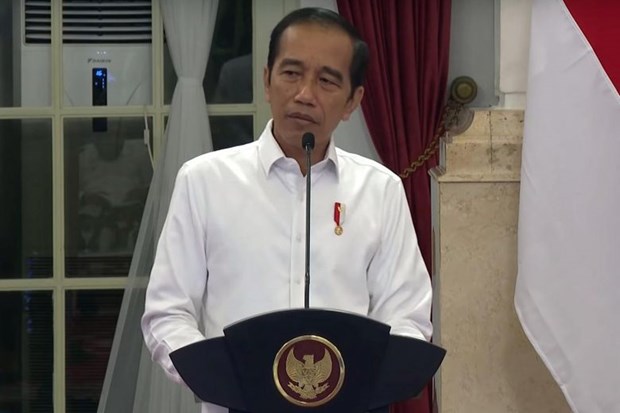Indonesian President orders quick disbursement of budget for COVID-19 fight
Indonesian President Joko Widodo has ordered the Health Ministry to immediately disburse the 75 trillion rupiah (5.26 billion USD) budget earmarked to tackle the COVID-19 pandemic.
 |
| Indonesian President Joko Widodo (Photo: Indonesia Presidential Palace) |
Addressing the Cabinet meeting to evaluate outcomes in the COVID-19 fight on June 29, the President called for the ministry to cut complicated procedures to allow the prompt disbursement of the emergency funds.
According to him, claims from hospitals must be paid as soon as possible. Incentives to medical workers and laboratory staff must also be given as immediately as possible.
His order came after a video of an uncharacteristic reprimand, released online at the weekend by the presidential palace, expressing his anger and disappointment that only 1.53 percent of the total budget had been disbursed and instructed Health Minister Terawan Agus Putranto to speed up spending.
The government has allocated the budget for several purposes, ranging from upgrading 132 referral hospitals across the country to provision of incentives to health workers.
The bulk of the 75 trillion rupiah budget is earmarked for buying medical equipment, enhancing health facilities and infrastructure and supporting health workers, according to Coordinating Ministry for Human Development and Culture.
Incentives for doctors and nurses range from five million rupiah to 15 million rupiah each month, while allowances for each family of deceased health workers are 300 million rupiah.
During the June 29 meeting, the President also again called for a "breakthrough" in dealing with the pandemic, such as mobilising medical workers from Jakarta to regions with high rates of contagion and distributing more health equipment to areas in dire need.
He also warned regions to prepare well before easing their restrictions and moving transition into the new normal and underlined the need to involve community and religious leaders, sociologists and anthropologists in public communication about the virus in order to reach out to people at the grass roots.
Source: VNA